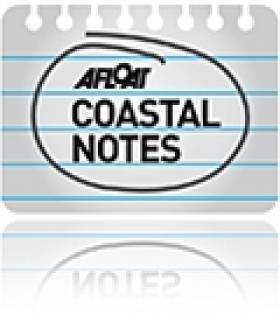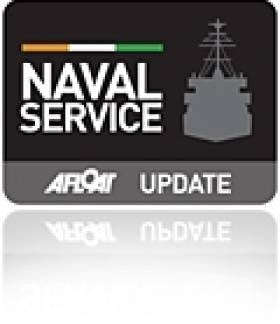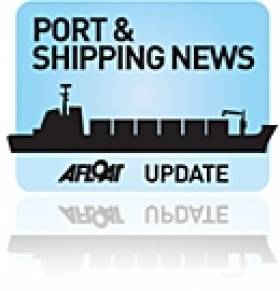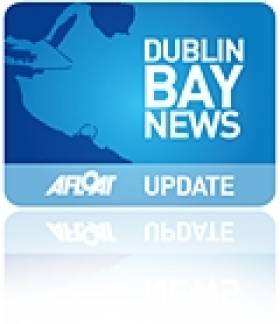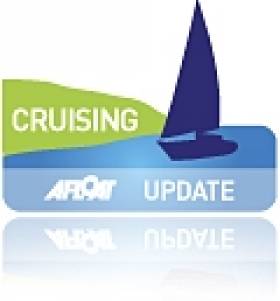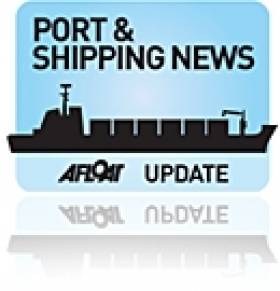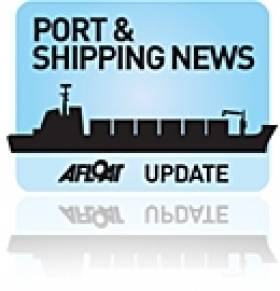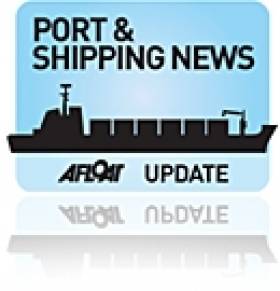Displaying items by tag: Pirates
#TallshipsDublinRiverfest - Lining the Liffey quays are a flotilla of tall ships for Dublin Port's 'Riverfest', the second time the sailing and maritime festival has been held and where the public can board these beautiful vessels free of charge, writes Jehan Ashmore.
The bank holiday weekend held Riverfest (31 May-2 June) welcomed visiting tall ships which berthed today along North Wall Quay, from where the public will be able to thread timber decks and meet some pirates too! In addition to other events and activities held along the quays, for details visit the festival programme.
Among the vessels previously reported, is veteran Ruth, a century-old gaff-rigged schooner built in Sweden to serve in the Baltic, now the Penzance based vessel offers sailing holidays. The Cornish vessel had anchored in Killiney Bay off Sorrento Point, Dalkey and from noon she met fellow tallships in Dublin Bay before heading in to the city-centre berths.
The flotilla was met by the Naval Service STV L.E. Creidne which led them into the the port channel and through the East-Link bridge.
Also making an appearance is L.E. Roisin (P51) the leadship of a class of Offshore Patrol Vessels in which the design of the new L.E. Samuel Beckett (P61) is based upon. Another grey hulled vessel on view will be a Revenue Commissioners custom cutter.
Not to be missed are tugs dancing!... yes that's right, as Dublin Port's pair of tugs get into the action too with an impressive display on the river. The starring tugs are the green hulled Beaufort and Shackleton.
Of the larger tall ships, they are the 70m Gulden Leeuw, the 45m Pelican of London which is take part in the Drogheda's Irish Maritime Festival in mid-June and 48m Morgenster. On board the trio were around 100 youngsters from the north and the rest of this island nation. The latter vessel having called to Belfast this week to announce the return of the Tall Ships Races to the city next year.
As for the Ruth, the schooner has company with counterparts, Irene, Soteria and Vilma adding to the sense of a traditional bygone era of sail. Plus our very own replica barque, Jeanie Johnston, again free tours telling the story of famine and emigration to the US.
Another Liffey ‘resident’ is the Dublin built TSMV Cill Airne, a rivetted hulled former Cobh liner tender now restaurant venue where an Admirals Ball is to be held on Sunday.
It is understood that the berths for the tallships are moored alongside new pontoons which will remain permanent following the Riverfest's finale when on Monday there will be a 'Parade of Sail'.
NATO Anti-Piracy Mission Comes Under Fire
#pirates – This morning while conducting routine surveillance off the Somali coast, HNMLS ROTTERDAM the flagship for the NATO 'OCEAN SHIELD' counter piracy mission, came under sustained fire from groups of suspected pirates.
A boarding team from Rotterdam was making an approach on a suspect dhow near the coast when they came under fire from ashore and from the dhow itself.
Rotterdam returned fire in accordance with Rules of Engagement, during which the dhow was seen to ignite and crew members were observed leaping into the water.
One crew member of the dhow was killed in this action and 25 people were subsequently rescued from the water by Rotterdam. Commodore Ben Bekkering, the commander of the NATO Task Force, said that the Rotterdam and her boats remained under sustained fire from the shore throughout, even while attempting to rescue the crew of the stricken dhow and one of Rotterdam's rigid inflatable boats was damaged. More information in attached document.
'Ireland's First Coconuts' Found in West Cork Shipwreck
#COASTAL NOTES - A 17th-century merchant vessel recently discovered off West Cork could have carried Ireland's first coconuts, the Irish Examiner reports.
The shipwreck near Schull was discovered embedded in silt 30ft below the surface by workers laying pipes for the town's new waste treatment plant.
A diving exclusion zone has since been established in the area to protect the site from looters and allow marine archaeologists to investigate the wreck undisturbed.
Coconuts found in the wreck indicate that the vessel was returning to Irish waters from the Caribbean.
Experts are hoping to establish the cause of the shipwreck, which may have been due to dashing against rocks in bad weather.
It is also speculated that the ship went down around the same time of the Sack of Baltimore in 1631, when North African pirates from the Barbary Coast attacked the area, kidnapping hundreds of locals.
The Irish Examiner has more on the story HERE.
Ireland Could Join Effort to Battle Somali Pirates
#NAVAL SERVICE - Ireland could soon join the fight against Somali pirates in the Indian Ocean, the Irish Independent reports.
Minister of State Fergus O'Dowd confirmed that the Department of Defence was considering sending a personnel detachment to assist the EU's naval mission in the area west of Africa.
The region has been blighted by pirate attacks on merchant vessels and pleasure cruisers for a number of years.
Most recently, as reported on Afloat.ie, the situation prompted an interruption to the Volvo Ocean Race - with the six yachts shipped on a secret route to the United Arab Emirates under armed guard.
Ireland's potential contribution to the EU's Operation Atalanta is known as an autonomous vessel protection detachment (AVPD), and would be used to protect the likes of food aid ships from the World Food Programme that sail without a naval escort.
The Irish Independent has more on the story HERE.
NATO Foils Pirate Attack
#PIRATES– On 28 November, the Royal Navy vessel, RFA Fort Victoria was patrolling in an area approximately 420 nautical miles from the Seychelles and 350 nautical miles from the Somali coast as part of NATO's counter piracy task force 508.
Early that morning, she received information that a Spanish fishing vessel operating to the north of their position had come under attack from a group of pirate vessels to the North of their position. The ship's Lynx helicopter was quickly despatched to investigate.
Once at the scene, the helicopter identified two suspect vessels, a whaler and a skiff, in the vicinity of the fishing vessel. The faster of the two, a skiff, sped away at over 25 knots as the helicopter gave chase. When the skiff ignored orders to stop, the Lynx helicopter fired warning shots ahead of the fleeing vessel which stopped and the suspected pirates onboard were then transferred to Fort Victoria via boat.
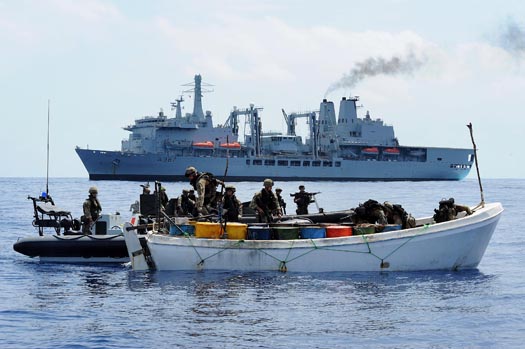
RFA Fort Victoria was approached by a pirate skiff at speed as they attempted to board her, However after Fort Vic laid down warning shots using their Miniguns the pirates had a sudden change of heart and started to make a run for it. Fort Vic gave chase and launched her boarding teams to stop them.
Fort Victoria's Royal Marines boarding team then boarded the whaler and another skiff in the vicinity. As a result of the day's action, a total of seven suspected pirates were detained onboard Fort Victoria along with their whaler as evidence, with no injuries being sustained by either side.
Captain Gerry Northwood Royal Navy, embarked in Fort Victoria said:
"It has been a long but rewarding operation with many complex aspects. Operating under NATO tasking and in consultation with our headquarters in the Middle East and in the UK, we utilised a range of national and international assets to bring these events to a satisfactory conclusion. Fort Victoria has once again demonstrated that multinational coordination can be successfully deployed to disrupt piracy in this area in order to protect international merchant shipping."
Dun Laoghaire Harbour's Sunday 'Family-Funday'
Opening times are 11am to 5pm and the entry fee is €3 for adults and children go free. The Funday is to help raise funds to support the local national maritime museum of Ireland in Dun Laoghaire. The Maritime Institute of Ireland is a registered charity, which run the museum through volunteers. In addition they host lectures, represent maritime interests and operate a museum and library.
The museum is housed in the former Mariners Church and is currently closed due to renovation and improvement works. There will be a 'soft launch' or 'preview' of the museum from October to mark the M.I.I.'s 70th anniversary.
Next year the museum is due to be officially re-opened during the Easter. The M.I.I. welcomes new members, volunteers and donations. For further information visit www.mariner.ie
- Pirates
- Carlisle Pier
- Dublin Bay News
- Maritime Institute of Ireland
- Dun Laoghaire Harbour
- M.I.I.
- Mariners Church Dun Laoghaire
- Dun Laoghaire Harbour News
- Irish maritime museums
- Family Funday
- DART Dun Laoghaire
- DART railway
- Pirats and Princesses competition
- Irish maritime interests
- Irish maritime lectures
- Irish maritime library
- National Maritime Museum of Ireland
- NMMI
Cruising Association Shocked by Fatal Shootings
Scott Adam was a member of the Cruising Association and was taking part in the round-the-world Blue Water Rally.
The Cruising Association is Britain's leading organisation for cruising sailors with members worldwide and works closely with government and other agencies to represent the interests of cruising yachtsmen including combating the menace of piracy.
"Our thoughts are with the family and friends of those who died", the statement ended.
NATO Issue Guidelines to Prevent Piracy
The products tanker Ardmore Seafarer (2004 / 45,744 dwt ) which was at sea 1,000 (nm) nautical miles off Somalia and some 500 nm off the coast of India, came under the attack of pirates last year.
The 179m long vessel which is operated by the Cork based Ardmore Shipping Group managed to evade the attack and potential seizure of the vessel thanks to the decisive action of the ships master, Captain Benamu. For more information about the Irish based company here and for a picture of the vessel click this link.
Though, the fate to other commercial shipping, was less fortunate, when 23 vessels were attacked in the Arabian Sea alone, in January of this year. Five of those attacks have resulted in the ships being taken over and held by the pirates.
To combat this threat, NATO, the EU Naval Force (EUNAVFOR) and Coalition Maritime Force (CMF), together with warships from other nations, continue to operate in attempting to prevent pirate hijacks. Though not every vessel can be guaranteed a warship to intervene from the threat of pirates, due to the sheer size of the sea area, which is the equivalent to an area the size of western Europe.
On an annual basis, there are approximately 22,000 ship movements that transit the Gulf of Aden and many of these now use Best Management Practices (BMP).
Some of the guidelines set by the BMP is for a vessel to set a high speed through the area, the placing of barbed wire around the ship and the use of water cannons to ward off an imminent attack. Ships with a low freeboard and at a slow speed, and small vessels, such as yachts, are particularly vulnerable to pirate attack.
Since December 2008, NATO has contributed to the international counter piracy effort off the Horn of Africa. This requires protecting the ships providing UN and World Food Programme through Operation Allied Provider and in general merchant shipping traffic plying in the Gulf of Aden.
In addition to these activities, Operation Ocean Shield, NATO is working with other international bodies to help develop capacity of countries in the region to tackle piracy on their own.
Under the Standing NATO Maritime Group 2 which is permanently assigned to NATO. This is a multi-national naval group formed through the NATO Alliance that provides a stand-alone task force with the ability to quickly respond to crisis situations anywhere in the world.
The current commander of NATO Maritime Group 2 is Commodore Michiel B. Hijmans of the Royal Netherlands Navy. The fleet consists of the Dutch HNLMS De Ruyter (the 'flagship' of the international fleet), HDMS Esbern Snare (Denmark), USS Bainbridge and USS Laboon (USA) and TCG Giresun from the Turkish Navy.
NATO is to continue operating their counter-piracy measures by extending Operation Ocean Shield to December 2012. To read more about the pirate attacks, the Best Management Practices and general advice for vessels logon to the NATO Shipping Centre www.shipping.nato.int
Tanker Newbuilds for Cork-Based Global Operator
Ardmore Shipping Ltd manages the activities of the Ardmore Shipping Group, which is engaged in the ownership and operation of chemical and products tankers trading on a worldwide basis. The Irish registered company runs its global fiscal operations from the group's head-office based in Cork.
Like the existing fleet, the newbuilds are also to be registered in Majuro, the capital of the Marshall Islands, a republic nation in the Pacific Ocean. The Micronesian nation of atolls and islands attained independence 25 years ago under a Compact of Free Association with the United States.
Last month, two vessels entered service for the company, the Ardmore Centurion (2005 / 28,987 dwt) formerly the Elisa, is to date the company's only joint chemical and products tanker. The second December debutant was the slightly older, Ardmore Seatrader (2002 / 47,141 dwt) a products tanker, formerly the St. Georg. In fact both vessels were handed over within a 12-hour timeframe and on opposite sides of the world.
When the second newbuild is completed in 2013, this will bring to three the number of chemical and product tankers in service, with the Ardmore Centurion, which was also built in South Korea but at the STX Shipyard Jinhae. The Ardmore Seatrader, built by the Onomichi shipyard in Japan, now forms the third product-only tanker, out of the four-strong mixed vessel type fleet.
This leaves the two remaining product tankers, the Ardmore Seamaster (2004 / 45,840 dwt) which entered service in October. The vessel was the former Formosa 12 and was also built in Japan but at the Shin Kurushima shipyard. She will be employed under a long-term charter to D/S Norden of Copenhagen.
The last vessel of the Ardmore Shipping Group fleet, is the Ardmore Seafarer (2004 / 45,744 dwt) which entered service in July. The former Zoa Express, was completed at the Minami-Nippon Usuki shipyard in Japan. She was re-named in honour of the Ardmore's seafarers and in recognition of 2010 as the International Maritime Organisation (IMO) Year of the Seafarer.
Interestingly that in the Year of the Seafarer, in particular for the welfare of the crew of the Ardmore Seafarer, she came under the threat of pirates!... While on route from Dar Es Salaam to Fujairah the vessel was attacked by the pirates, 1,000 (nm) nautical miles off Somalia and some 500 nm off the coast of India. Thanks to quick and decisive actions, Captain Benamu and his crew evaded capture, ensuring that the pirates were unable to seize control of the 179m (length) X 32m (breadth) vessel. To see a photograph of this vessel click the link HERE
NATO Vessel Fires Warning Shots at Pirate Skiff
Planning a world cruise? Think twice before taking in the Gulf of Aden. Only two days after the latest pirate attacks in the Gulf, Danish warship ESBERN SNARE disrupted a group of suspected pirates in a skiff believed to be preparing for an attack. The pirates were initially detected by a Japanese maritime patrol aircraft in the Internationally Recommended Transit Corridor (IRTC) in the Gulf of Aden. ESBERN SNARE's helicopter fired warning shots in front of the skiff to force the suspected pirates to stop. The suspected pirates finally stopped after a shot was fired through the bow of the skiff.....

HDMS ESBERN SNARE, her boarding teams in their boats next to the pirate skiff

The suspected pirates in their skiff - a suspected pirate can be seen throwing a weapon over the side into the water
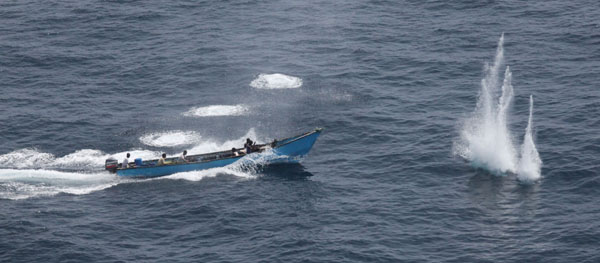
The pirate skiff and water spray after ESBERN SNARE's team fired warning shots ahead of the skiff to force the suspected pirates to stop in the water




























